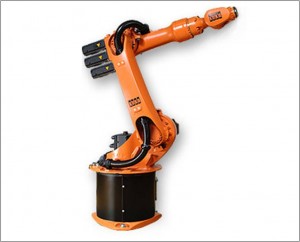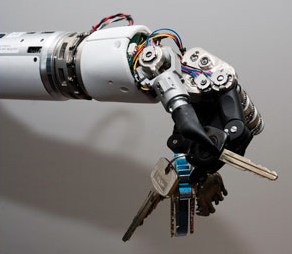or Mechatronic Engineering, humourously (but incorrectly) referred to as Megatronics at times. In Afrikaans Megatronika or Megatroniese Ingenieurswese. What is it? What can you do with it? When I started studying I didn’t know, after 5 years I think I have a vague idea. So below I’m going to post what I know.
In it’s simplest form it’s a combination of Mechanical and Electronic Engineering. If I really don’t feel like explaining, I simplify it to robotics. This is certainly a large portion of Mechatronics, but by no means a limiting factor.
Mechatronics as a named profession is fairly new, but the idea has always been there. In the South African context, UCT have had an accredited BSc (Eng) Mechatronics course since 1997 (although how long it has actually been running is uncertain), NMMU a BEng since 2007 (first graduates) and Stellenbosch since 2005 [1]. Potchefstroom University (NWU) are apparently aiming to start a course in the next few years [2]. Although not offered in the BEng format, UKZN do offer Masters through their Mechatronics and Robotic Research Group [3]. [EDIT: added list of BTech degrees and Diplomas offered at the bottom of the post]
Mechatronics at Stellenbosch [2]
I completed my BEng Mechatronics at Stellenbosch University in 2011. The Mechatronics course was presented by the Department of Mechanical and Mechatronic Engineering in a four year course. The first two years were identical to that of those studying towards a BEng Mechanical. The first year course is identical for all engineering students. In the third and fourth years, the two courses still followed similar routes, with the Mechatronics course replacing several Mechanical courses with some courses presented by the Department of Electronic and Electrical Engineering. In third year these included Electronics and Computer System’s courses and fourth year Electronics and Electronic Design Courses. Losing out on some Strength of Materials and Thermo-Fluid Mechanics.
The department put it this way [6]
The most important difference between the mechanical engineering programme and the mechatronic programme is that mechanical engineers are equipped to develop mechatronic systems with existing controllers (computers, PLC’s, etc.), while mechatronic engineers are also equipped to develop specialised controllers (e.g. for embedded controllers) and the relevant electronics themselves.
At the time, the Head of Department felt that Mechatronics as an entity was still too new. Employers weren’t advertising for Mechatronic Engineers, and didn’t really know what to do with them when they did get them. This resulted in the close ties between the Mechanical and Mechatronic courses. I was often unhappy about this, having would of preferred more focus on the Electronics, but in the end it worked out. And the HoD’s opinions were/are valid.
When I chose Mechatronics, I didn’t know where I was going to work, I chose the course because it sounded interesting. It wasn’t until my final year that I found a direction to work towards. Course setups at different universities are going to be different, and will put emphasis on different subjects, that doesn’t necessarily make one better than the other. Either way you’re going to come out of it with a degree and a fair amount of knowledge. Most importantly though (and this is true for any engineering degree) is you’ll know how to learn.
I’m quite confident that specific things that I learn in my first year of work will be of more value to my career than a specific subject at varsity, but having struggled through several subjects, I know I can figure out most things that come my way. I know where to look and how to go about solving problems.
In my final year we were a class of 85 Mechanical/Mechatronic students, of which I’d say about 30-35 received their BEng Mechatronics in 2011.
Mechatronics at NMMU [2]
NMMU have a slightly different setup. Mechatronics is presented by the Mechatronics school of the Department of Engineering, the Built Environment and IT. Mechatronics is the only Engineering degree they offer. As such, first year physics and maths are taken alongside BSc students and after the first year, courses taken are aimed only at Mechatronics students. The format of the course is still identical to that of when it started giving a good balance of subjects. The University also offers an array of BTech degrees in other Engineering fields.
I’m currently pursuing my master’s degree at NMMU. Their 4th year BEng Mechatronics class has roughly 25 students in it and the 3rd year class about 30. First year applications are limited to 60, with the most recent 1st year class starting with 50 students. The Mechatronics department is currently sponsored by General Motors South Africa (who have a plant in PE) and also have close ties to the Volkswagen plant in Uitenhage.
Mechatronics in General
Mechatronics as a career is still finding its feet. Meaning many consider it a jack of all trades, master of none type of situation, and although the course may feel that way, it’s certainly not the end of the story.
Mechatronics isn’t a new field, it’s just finally been given a name. When you tell people you’re a Mechatronic Engineer they don’t know what that is. I had a month stint at a large production facility as part of vacation training and I was asked to choose between focusing on their Mechanical or Electrical divisions, eventually settling for a bit of time at each. But that’s how businesses in SA are structured. This will change.
Several Mechatronic Engineers that I know have taken up Automation maintenance posts. Nothing wrong with this, personally it’s not where I want to be. Contrary to this though, my first job next year will be in automation maintenance. I however plan to use this as a stepping stone into a design career.
Automation is fun, and whereas I am going into automation in a production sense, automation also relates to smaller and/or more technical situations. The recent landing of the Curiosity rover on Mars is a perfect example of Mechatronic systems. There are several elements here, from the automated landing system to the remote control of the device.
In the motor industry, systems such as traction control, ABS and ESP are all examples of Mechatronic systems. Heavily complicated systems that rely on the processing of data from sensors to enable control of actuators. As such a Mechatronic Engineer can make him/herself home in many different industries. These include the Automotive, Aerospace, Manufacturing, Medical and Communications Industries.
Mechatronic Engineers can register with ECSA to become Professional Engineers [4]. The industry is governed by the South African Institute for Mechanical Engineers. I don’t see Mechatronics separating from this tree any time soon. The degree, being accredited by ECSA also means that the degree will be recognised internationally in many countries thanks to the Washington, Sydney and Dublin Accords [5]
So what do you do when you have your degree? You do whatever you want. You’ll find something. I’m not aware of any of my colleagues who are currently not pursuing a post-graduate degree or are employed. Not all of them are in Mechatronic specific posts. Some have opted for more mechanical orientated jobs, while others have gone entirely into areas such as electronic design or programming. And that’s one thing, a degree in Mechatronic Engineering in no way limits you. Very few engineering degrees will actually.
After re-reading what I’ve written, I think I’ve put forward some information relating to Mechatronic Engineering, but it’s still left fairly vague, maybe it’s just because none of us know what we’re really doing :)
A National Diploma in Mechatronics (for registration as a Professional Engineering Technician) can also be had from the following institutions [7]:
- Tshwane University of Technology
- UNISA
- Cape Peninsula University of Technology
A BTech in Mechatronics (for registration as a Professional Engineering Technologist) from [8]:
- Tshwane University of Technology
- UNISA
- Cape Peninsula University of Technology
and to reiterate, a BEng, or BScEng (for registration as a Professional Engineer) [1]:
- Stellenbosch University
- University of Cape Town
- Nelson Mandela Metropolitan University
Note: Although other institutions may offer courses in Mechatronics, or Mechanical Engineering with a focus on Mechatronic elements, the ones listed above are the only ones recognised by ECSA for registration as a mechatronic professional. Information was correct at time of posting, but may have changed since.
There are also several Universities of Technology and FET Colleges which offer courses in Mechatronics. CPUT is one of these institutions. Another training institution is Umbilo Training Specialists in Durban. They are running a free training course, once a month where anyone can come to learn more and expand their knowledge. Checkout their page for details.
For some more reading and a very complimentary view with some poignant remarks have a read here.
As part of my degree at Stellenbosch University I completed a project which can be seen here.
As part of my master’s degree at NMMU I completed a project which can be seen here and here.
If you’re looking for bursaries, try this website.
If you have any questions, feel free to ask in the comments section.
- [1] ECSA – Accredited Universities
- [2] Much of what is stated comes from my own experiences and conversations with relevant people.
- [3] UKZN – Mechatronics and Robotics
- [4] ECSA – Registration
- [5] ECSA – Recognised Qualifications
- [6] Stellenbosch University – Mechatronic Engineering
- [7] ECSA – Accredited Diplomas
- [8] ECSA – Accredited BTech





Hey
How do you find vacation work?
Your best option is to speak with friends, especially family friends. Regardless of the industry in, it is the easiest way to get into holiday jobs. Otherwise apply with large organisations, mines, factories, they are often on the lookout for students. Try find someone who works there that you can speak to directly to try and get a position.
Hi Gareth
When you complete the National Diploma at Unisa: Qualification stream: Mechatronics Qualification code: NDEEN – MEC, can you apply to do the State competency examination to qualify as an Engineer.
Regards
Hi Bertus, which State competency examination are you referring to? If you complete your NDip, you will be able to apply to ECSA to register as a Professional Engineering Technician.
My son is in grade 11 take Science, Maths English,Business,Geography, etc he has a bursary at Bergvliet High School he was thinking of going into Robotic engineering or aeronautic Engineering .What subjects is needed for Cape Town UCT and what percentages is needed how long do you study plus minus please anything info would be of help please.I await your response urgently please. When do we apply in grade 12? Thank you Tracy
Hi Tracy
Each university has different requirements and times for applications. Contact each university specifically, or look around there websites, the information is readily available.
For an Engineering degree, Maths and Science are the main prerequisites. With Techincal Drawing and Programming being of benefit, but not a requirement.
my name is SBU ,I’m grade 11 leaner and live in pe.I am interested in at studying mechatronics after grade 12,the problem is I’m not in a technical school,I don’t have foundation electrical& mechanical engineering,computer science. I think of opting to pe college for level 2 after matric , then do my first the next at nmmu
To get in for mechatronic engineering, you only need to have Pure Maths and Physical Science, no other courses.
hi just came across your blog, very interesting Hoping you can offer some insight
what was the female ratio in classes ?
Hi Reena
When I was studying (graduated 2011) it was a rather poor ratio, about 8 guys to each girl in our combined Mechanical/Mechatronic class. This has been improving a lot recently, I don’t have exact figures, but across the board, engineering is attracting far more women than ever before.
I’m doing engineering metallurgy at uj but I want to change to mechanical or mechatronics I just want to know which one pays more those 2 and as well as physical metallurgy
Hi Mpho, one can’t differentiate between pay based solely on what you studied. So many factors to consider. With any engineering degree you should be able to earn a good living. Ideally you should not be making this decision based on salary.
how would you advice a
grade12 learner to prepare his/her undergraduate studies in such a broad field. as mechatronics
Hi Sibusiso,
I’m not sure I completely understand your question. Are you referring to what you can do in advance of your studies to prepare yourself?
The syllabus for each year of your studies should be available, as well as required reading material. All I can suggest is going over this in advance, identifying areas you think you may struggle in and focusing on those beforehand.
Hope that answers your question.
Good luck
Thanks you. that was on point
I’m currently doing grade 9, and I will be choosing subjects on the 18th October for next year. I’m good in mathematics and Physics, and would like to persue the degree in Mechatronics. Beside the above two, what are the other subjects I should choose.
Those are the only two subjects that you will need to get into the course, but Engineering Drawings and IT (programming) will both help you out through your course.
Hey Gereth, my name is Portia. I passed my grade 12 in 2013 I got level 2 in pure mathematics and level 3 in physical sciences from a very previously disadvantaged school. After hearing about this discipline (BEng mechatronics) with my whole heart I fell in love with it. To make the long story short, after seeing that I don’t meet the requirements I upgraded maths and physics in 2014 the results were worst I assume it was due to the new searlerbus (cabs) & 2015 I tried again and I got level 4 physics and 3 mathematics. So this year I applied in TUT, NMMU & CPUT. Unfortunately in TUT my application was not successful as they have just responded. The other 2 haven’t responded but now I’m very stressful that it might be the same with the other 2 because my maths results are not that good enough. I don’t know anymore what should I do to make this long dream of mine to come to life ? :'( I am really stressed out now :(.
Hey Portia
I’m sorry to hear about the difficulty you’re having in studying Mechatronics. The requirements are set quite high for engineering because a lot of people want to do it and there isn’t enough space for everyone, there’re also quite a few people who fall out in the first year.
If you don’t get in for engineering at a university or technikon, my suggestion would be to apply do a science degree or diploma. After studying this for a year, you have the opportunity to prove that you are able to do the work. You can then request a transfer to an engineering course. It will take a bit longer, but is generally a good way to get in.
Good luck!
Thanks Gereth, I think I should do that I really want to go to vasity next. Even if it’s gonna take me long. I have to persue this dream of mine.